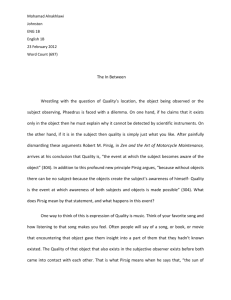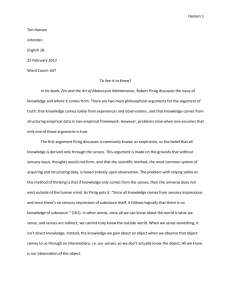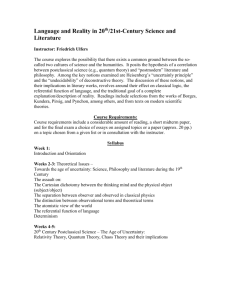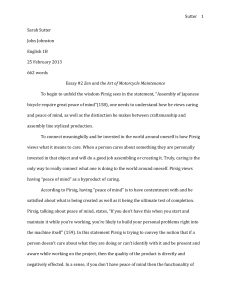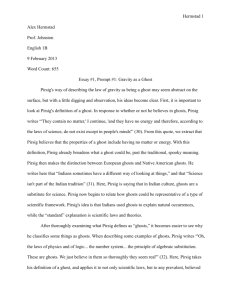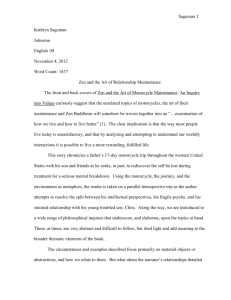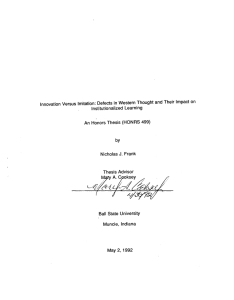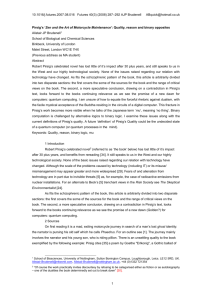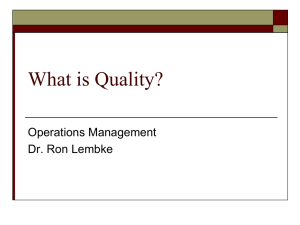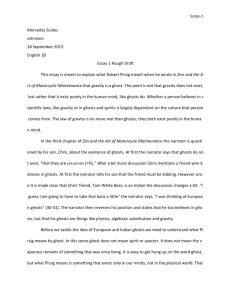Fountainhead
advertisement
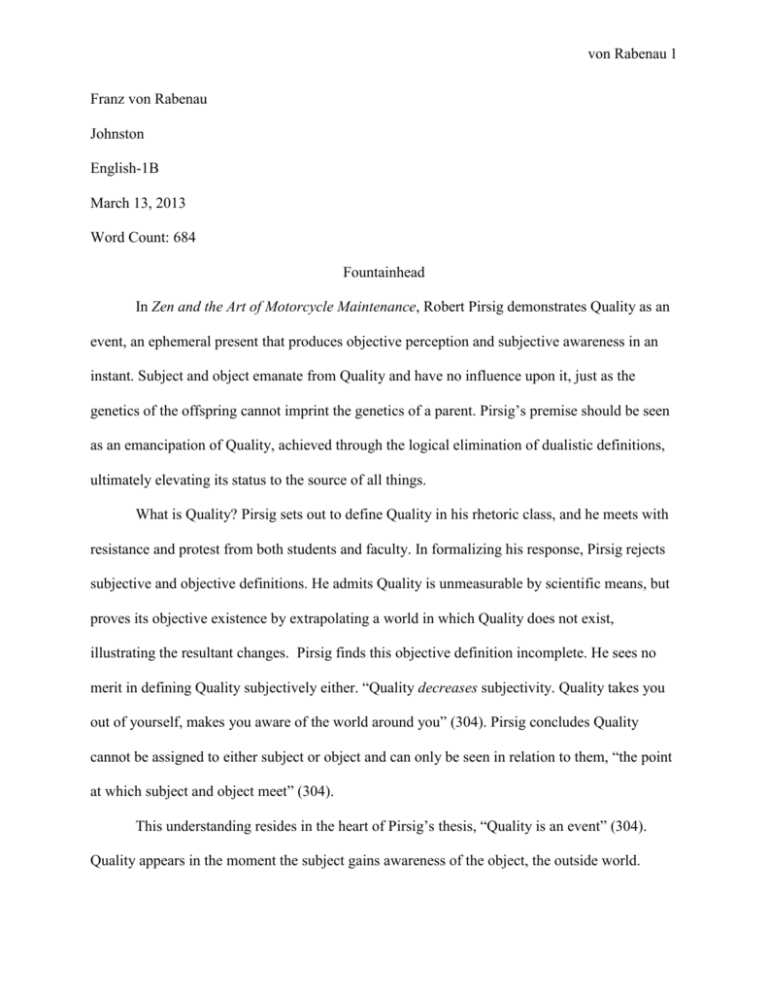
von Rabenau 1 Franz von Rabenau Johnston English-1B March 13, 2013 Word Count: 684 Fountainhead In Zen and the Art of Motorcycle Maintenance, Robert Pirsig demonstrates Quality as an event, an ephemeral present that produces objective perception and subjective awareness in an instant. Subject and object emanate from Quality and have no influence upon it, just as the genetics of the offspring cannot imprint the genetics of a parent. Pirsig’s premise should be seen as an emancipation of Quality, achieved through the logical elimination of dualistic definitions, ultimately elevating its status to the source of all things. What is Quality? Pirsig sets out to define Quality in his rhetoric class, and he meets with resistance and protest from both students and faculty. In formalizing his response, Pirsig rejects subjective and objective definitions. He admits Quality is unmeasurable by scientific means, but proves its objective existence by extrapolating a world in which Quality does not exist, illustrating the resultant changes. Pirsig finds this objective definition incomplete. He sees no merit in defining Quality subjectively either. “Quality decreases subjectivity. Quality takes you out of yourself, makes you aware of the world around you” (304). Pirsig concludes Quality cannot be assigned to either subject or object and can only be seen in relation to them, “the point at which subject and object meet” (304). This understanding resides in the heart of Pirsig’s thesis, “Quality is an event” (304). Quality appears in the moment the subject gains awareness of the object, the outside world. von Rabenau 2 Through awareness of the object, the subject becomes self-aware. There is no “I” without other; subjective awareness does not exist without comparison to an external stimulus. Pirsig says, “Quality is the event which makes awareness of both subjects and objects possible” (304). This event, Quality, spawns both subject and object and, therefore, cannot be subservient to either. Attempts to assign purely subjective or objective values to Quality fail, in Pirsig’s view, because it is the catalyst creating both. Quality is not subject to their duality. Quality, preceding subject and object, is found in the moment that creates relationships between them. For Pirsig, this moment is significant and constitutes the present. “You can’t be aware you have seen a tree until after you have seen a tree and between the instant of vision and the instant of awareness there must be a time lag” (314). Pirsig asserts this lapse is often ignored or unjustifiably thought of as unimportant. This dropped moment, transitioning from perception to intellect, frames the present, separating it from past and future. Because of this time lag, Pirsig says, “Any intellectually conceived object is always in the past and therefore unreal” (315). By the time it can be comprehended, the tree is a memory, subject to the same a priori knowledge and experiential wisdom, or analogues as Pirsig calls them, as any other memory. The perceived tree is outside of the present and unreal. Reality, Pirsig believes, dwells solely in the present. The subject only perceives the object with purity during the Quality event, prior to processing the combined data of new experience and analogue. “Reality is always the moment of vision before the intellectualization takes place. There is no other reality” (315). Reality exists only in this moment, the present, in the lapse of time that lies between sensation and cognition. It is in this reality that Quality is found. Pirsig explains, “At the cutting edge of time, before an object can be distinguished, there must be a kind of nonintellectual awareness, which he called awareness of Quality” (314). Pirsig deduces von Rabenau 3 further: because all knowable things spring from this moment of nonintellectual awareness, “Quality is the parent, the source of all subjects and objects” (315). In describing Quality as transitory event instead of static entity, Pirsig refocuses a rhetorical question, placing Quality as parent or cause of both subject and object rather than an effect of either. The subject/object duality no longer exerts control over Quality because subject and object spring from the moment of awareness that is Quality. This paradigm shift is Copernican in stature, revealing the moment subject and object, two irreconcilably opposed dialectics, converge, emerging as codependent siblings circling the fountainhead, Quality. von Rabenau 4 Works Cited Pirsig, Robert M. Zen and the Art of Motorcycle Maintenance. New York: William Morrow & Company, Inc. 1974. Print. The essay I’ve submitted represents an earnest attempt to examine an idea and to share with readers my thinking, insights and values. I affirm that I have respected the importance of my intellect and the worthiness of the question at issue by honestly exploring the issue and carefully constructing my argument so that a reasonable person can understand my ideas and consider them intelligently.
